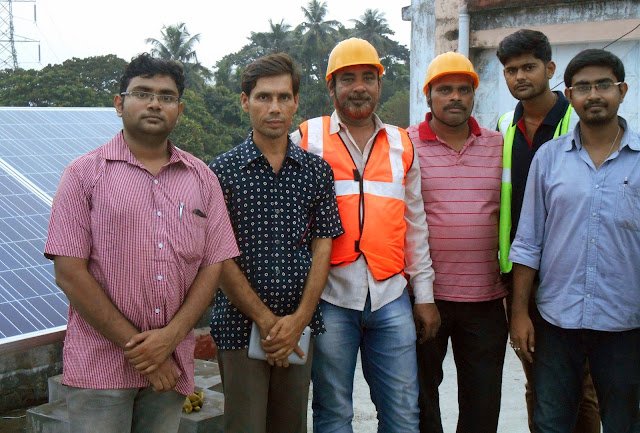Solar Training for Professionals and Startups
Solar training programs for both professionals looking to advance their careers and startups seeking to enter the solar industry. These programs cover a range of topics, from basic solar PV technology to advanced design and installation techniques, as well as business and entrepreneurial aspects. Solar PV Professionals are skilled professionals in the solar energy industry who combines deep technical and financial expertise to ensure the success of PV (photovoltaic) systems.
The market for solar, EV, and battery technology courses presents a significant opportunity due to the rapid growth of the renewable energy and electric vehicle sectors. The solar energy market is experiencing substantial growth, with government policies and initiatives promoting the adoption of renewable energy sources. The battery storage market is also expanding rapidly, fueled by the increasing adoption of renewable energy sources and the need for energy storage solutions.
Course offered by "Institute of Solar Technology" & "Academy of EV Technology"
Course offered by "Institute of Solar Technology" & "Academy of EV Technology"
Professionals and Startups Solar Skill Training
These programs help professionals gain practical skills and knowledge to enhance their resumes and job prospects. Solar training programs for startups can focus on solar PV system design, installation, and maintenance, as well as how to start a solar business. These programs often cover topics like site selection, system sizing, and troubleshooting, and may also include training on solar business development, financing, and regulatory aspects.
Starting a solar business can be a lucrative and sustainable venture. To succeed, it's crucial to understand the market, develop a robust business plan, and ensure you have the necessary legal and technical expertise. This guide outlines key steps for establishing a solar business, from initial research to ongoing operations and marketing.
Solar training programs for working professionals offer opportunities to gain practical skills and knowledge in the solar energy industry, often tailored to their existing work experience and career goals. These programs can enhance existing skills or provide a foundation for entering the solar sector, covering topics like system design, installation, maintenance, and sales.
Training for Startups:
-
Business Fundamentals:Startups benefit from training that covers business aspects of the solar industry, including market analysis, business planning, and financial models.
-
Sales and Marketing:Programs can help startups develop effective sales and marketing strategies for solar products and services.
-
Installation and Maintenance:Understanding the practical aspects of solar panel installation, maintenance, and troubleshooting is crucial for startup success.
-
Financing and Funding:Training cover accessing financing options and grants for solar projects.
-
Legal and Regulatory:Understanding the legal and regulatory landscape of the solar industry is essential for startups.
-
Industry-Specific Training:Programs are often tailored to the needs of specific industries, like real estate, finance, or insurance, to help professionals understand the impact of solar on their respective fields.
Key areas covered in solar training:
-
Understanding Solar Technologies:Familiarity with different types of solar panels (monocrystalline, polycrystalline, thin-film), inverters (string, micro), and other components. This includes understanding the basics of solar radiation, photovoltaic (PV) cells, and the process of converting sunlight into electricity.
-
Electrical Engineering:This involves understanding electrical principles, wiring, cable sizing, and grounding of PV systems.
-
Balance of System (BOS) Components:Courses cover the selection and design of other essential components like combiner boxes, circuit breakers, and protective devices.
-
Component Selection:Choosing the right solar modules, inverters, charge controllers, batteries, and other equipment.
-
Electrical Design:Sizing cables, designing grounding systems, and creating single-line diagrams.
-
Site Selection and Layout:Learn how to choose the best location for a solar project and design an efficient layout.
-
Shading Analysis:Evaluating the potential for shading from trees, buildings, and other obstructions to ensure solar panels receive optimal sunlight.
-
Solar Panel Sizing and Placement:Determining the optimal number and placement of solar panels on the roof to maximize energy production while considering factors like shading, roof orientation, and available space.
-
System Design:Understand how to size and design PV systems, including string and array design. Designing the electrical layout, including connecting modules, inverters, and transformers, to ensure efficient power conversion and grid integration.
-
Inverter Selection and Sizing:Choosing appropriate inverters that match the energy output of the solar panels and the building's electrical needs.
-
Grid Integration:Ensuring the rooftop solar system seamlessly integrates with the local electricity grid for consistent energy delivery.
-
Hybrid Systems:Hybrid systems combine elements of both grid-connected and standalone systems, allowing for both grid connection and energy storage.
-
System Optimization:This includes optimizing system performance by considering factors like tilt angle, orientation, and shading.
-
System Protection:Understanding and implementing safety measures, including lightning protection and grounding. Understanding and adhering to relevant safety standards and regulations for rooftop solar installations.
-
Performance Analysis:Calculating energy yield, performance ratios, and other key metrics to ensure the solar power plant operates efficiently.
-
Project Management:Managing the design, installation, and commissioning of the rooftop solar power plant, including coordinating with other professionals and adhering to safety regulations. Learn how to plan, implement, and manage solar projects, including project reports and budgets.
-
Financial and Economic Considerations:Courses may also cover aspects like life cycle costing, project financing, and financial modeling.
-
Cost Estimation:Learning how to estimate the cost of a solar power plant and calculate payback periods.
-
Economic Analysis:PVsyst can be used for economic analysis, including cost estimation and return on investment calculations.
-
Regulations and Standards:Understand relevant electrical codes and regulations for solar installations.
-
Case studies:Analyzing real-world examples of residential and commercial rooftop solar installations.
-
Troubleshooting and Maintenance:Identifying and resolving issues, as well as performing routine maintenance on solar PV systems.
Benefits of Taking a Solar Project Design Course:
- Career Advancement: Gaining expertise in solar design can open up job opportunities in the solar industry.
- Increased Knowledge: Learn about the latest technologies and best practices in solar design.
- Problem-Solving Skills: Develop the ability to design and implement solar projects effectively.
- Industry Networking: Institute provide opportunities to connect with other professionals in the solar field.
Who Should Take a Solar Project Design Course?
- Engineers and Architects: Individuals with a background in electrical or mechanical engineering or architecture can enhance their skills with a solar design course.
- Anyone interested in the solar industry: Whether you're a beginner or have some experience, a solar design course can provide valuable knowledge and skills.
Training Options:
-
Online Courses:Online Live class courses covering the all aspects of lithium-ion battery manufacturing and assembly.
-
Offline Courses:Offline hands-on training after Online classes with lab facilities and practical experience in assembling battery packs.
Introduce with Trainer:
-
Government of India Awarded Trainer: Profile PageMr Sanjib Roy, an expert in the field and a skilled facilitator, driving the success of their students / startups / entrepreneurs, one of the leading corporate trainers in India, facilitating a wide range of corporate training programs.
He is certified trainer of Solar Panel Installation Technician from NISE, Electronics Sector Skill Council of India (ESSI) on 27th Nov 2015. He teach and mentor of more than 10 thousand startup and engineers PAN India and abroad.

 Mentorship:He is providing guidance and support to students for their success career as startup or engineer.
Mentorship:He is providing guidance and support to students for their success career as startup or engineer.















 Arattai - Chat
Arattai - Chat